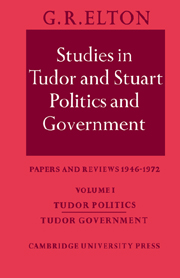Book contents
- Frontmatter
- Contents
- Preface
- Acknowledgments
- Abbreviations
- 1 The Terminal Date of Caesar's Gallic Proconsulate
- I TUDOR POLITICS
- 2 Renaissance Monarchy?
- 3 Henry VII: Rapacity and Remorse
- 4 Henry VII: a Restatement
- 5 The King of Hearts
- 6 Cardinal Wolsey
- 7 Thomas More, Councillor
- 8 Sir Thomas More and the Opposition to Henry VIII
- 9 King or Minister? The Man behind the Henrician Reformation
- 10 Thomas Cromwell's Decline and Fall
- 11 The Good Duke
- 12 Queen Elizabeth
- II TUDOR GOVERNMENT
- General Index
- Index of Authors Cited
10 - Thomas Cromwell's Decline and Fall
Published online by Cambridge University Press: 03 February 2010
- Frontmatter
- Contents
- Preface
- Acknowledgments
- Abbreviations
- 1 The Terminal Date of Caesar's Gallic Proconsulate
- I TUDOR POLITICS
- 2 Renaissance Monarchy?
- 3 Henry VII: Rapacity and Remorse
- 4 Henry VII: a Restatement
- 5 The King of Hearts
- 6 Cardinal Wolsey
- 7 Thomas More, Councillor
- 8 Sir Thomas More and the Opposition to Henry VIII
- 9 King or Minister? The Man behind the Henrician Reformation
- 10 Thomas Cromwell's Decline and Fall
- 11 The Good Duke
- 12 Queen Elizabeth
- II TUDOR GOVERNMENT
- General Index
- Index of Authors Cited
Summary
Even in the uncertain and tempestuous times of Henry VIII, Cromwell's fall from power was unusually sudden and precipitate. On 18 April 1540 he was created earl of Essex and great chamberlain of England, thus confounding his enemies and those onlookers who had seen him tottering for some time; for the next two months he appeared to be enjoying his master's confidence as much as ever; but on 10 June he was suddenly arrested at the Council table, hustled to the Tower, condemned without a hearing, and kept alive until a belated execution on 28 July only because Henry still wanted his testimony against Anne of Cleves. It is alleged that he foresaw his fall some two years earlier, and indeed it is probable that he was always aware of the dangerous insecurity of a position which so entirely depended on the royal favour; nevertheless, when the knife actually fell it seems to have taken him by surprise. How and why it all happened are questions that have often been considered, but may never find a completely satisfactory answer because the principal actors in the drama did not commit themselves on paper. Burnet pointed out long ago that Henry's dissatisfaction with Anne of Cleves cannot have been the sole or even the chief reason, because Cromwell obtained his last and greatest honours after that storm broke; he saw the decisive factors in the accusations of heresy which were brought against Cromwell.
- Type
- Chapter
- Information
- Studies in Tudor and Stuart Politics and GovernmentPapers and Reviews 1946–1972, pp. 189 - 230Publisher: Cambridge University PressPrint publication year: 1974
- 2
- Cited by



